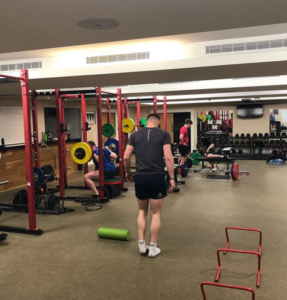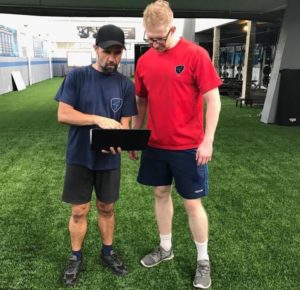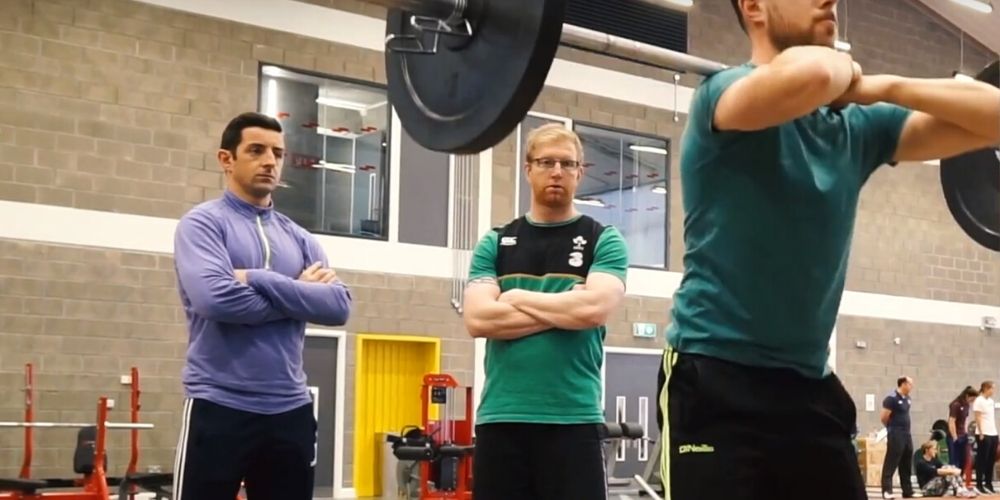With over 13 years’ working within health and fitness, Dean Lester has experienced first-hand the benefits of Strength & Conditioning within Personal Training. Witnessing both positive and negative movements in the fitness industry, he recognises Strength & Conditioning as important factor in the services a PT can offer, programme development and forming client relationships. As current lead to S&C Lansdowne RFC U.20s, lead S&C to Ballinteer St John’s GAA, and Assistant S&C at Blackrock College, Dean shares his thoughts on the industry and implementing Strength and Conditioning.

Dean on his first trip away with the senior team outside of Club Atlético Vélez Sarsfield, Buenos Aires.
Why is education important?
As it is the ‘era of social media’, there is a real worry for the direction that the fitness industry is going. ‘Influencers’ and ‘Insta Stars’ have become the norm. While Instagram (and other forms of social media) can be an extremely good platform to get relevant information, the reality is the general public can be drawn to the chiselled physiques on their news feeds with, let’s face it, questionable means as to how the physique was obtained in the first place. What we have now are self-awarded experts that are selling advice based on how THEY got in shape and not what necessarily works for the individual/general public.
So, where and how does Strength and Conditioning come in? To become certified at any level as an S&C coach there is an educational pathway that has to be followed before you can call yourself an S&C coach. Although you do come across some of the self-awarded coaches online, the majority will study and complete course work for a certificate, Diploma or BSc in the subject. These courses will cover many topics starting with Functional Screening, moving through resistance based modules, to speed, to training adolescents and special populations to name but a few. In fact, simply having a Functional Screening qualification will already set you apart from the majority of Personal Trainers. This is due to the fact that with this specialised knowledge you can look at a client as an individual and can consider programming based on the individual’s needs rather than the generic ‘one size fits all’ training plan, or the ‘let’s just exercise until you are sick’ mentality.
At the very least, a qualification of this nature will allow you to structure a needs based program for an individual with adequate knowledge to include basic exercise selection that will leave a body functional from day to day. Now that you’ve taken a step towards applying S&C principles to your service, you are already far more valuable than the PT who got their Certificate on the back of a cereal box.

Dean’s behind the scenes coaching of Lansdowne U20’s.
The Scientific Approach
To my knowledge, most S&C courses are based on peer review studies by some of the brightest minds in the world. From my own experience of studying with Setanta College, the course is littered with studies from Janda and his study of Upper and Lower Cross Syndrome (something as a personal trainer you will see a lot of due to the sedentary nature of a lot of jobs and the technological epidemic in kids now that no longer go out and play), to RAMP studies by Dr Ian Jefferies on warm up protocol. I could go on naming the most incredible scientists in the field but my point is this, applying S&C principles will most definitely help you make informed decisions on the direction of a clients program.
The ‘Relationship’ Factor
When I did my personal training qualification, I covered the very basic of content. I learnt nothing of how to structure a program, or what really is expected of a training program, and I certainly learnt nothing of tapping into different personality traits. Don’t get me wrong, I’m still a long way off being an expert but I’m certainly a lot better informed now than I was 10 years ago in how to deal with people and how to help them reach their goals. Believe me, I have made so many mistakes along the way. I continue to make mistakes. In fact, making mistakes is my strength. From there I learn, grow, and mature to help my athletes and clients do the same. The fact of the matter is you are never going to get buy in from everybody and that’s ok. Once you become comfortable with that and learn it’s not personal, it allows you to move on and focus your energy where you do have 100% buy in. Without this journey into S&C, this is an area I would never have thought to develop. While I’m a long way off I’m a lot closer than I was. Another area that without doubt has improved my ability to provide a more individualised service.

Dean and Craig White preparing for a training session with Uruguay’s National Rugby team.
Personal Trainer vs. S&C Coach
Can a Personal Trainer market themselves as an S&C Coach? In short, absolutely not. This is a very generalised comment because Personal Trainers do not have the skill set or knowledge base that a certified S&C does. Of course, there are isolated incidences where there are very knowledgeable PTs that perhaps could and do have that skill set.
Can a certified S&C Coach market themselves as a Personal Trainer? Absolutely yes. With the skill set and professional knowledge, an S&C coach can provide a service way beyond what the ‘fitness industry’ is offering today. I personally believe there is a need for a governing body that sanctions minimum, well I should say maximum requirements and at least a pathway of development to allow ‘fitness professionals’ an opportunity to grow in what is a health industry.
I’ll leave you with this thought, would you let a junior doctor perform heart surgery 3 months into their medical degree? Why put your health in the hands of someone who can take a good photo of themselves and maybe if your lucky, completed a personal training course in all of 5 weeks. It really is a no brainer. Give the scalpel to a steady hand.
You can learn more about our Diploma in Personal Training by clicking here, or have a look at our S&C pathway here. If you have any questions feel free to drop us a message below.


Keep up the hard work Dean, we are all very proud of your achievements thus far. Keep er lit.